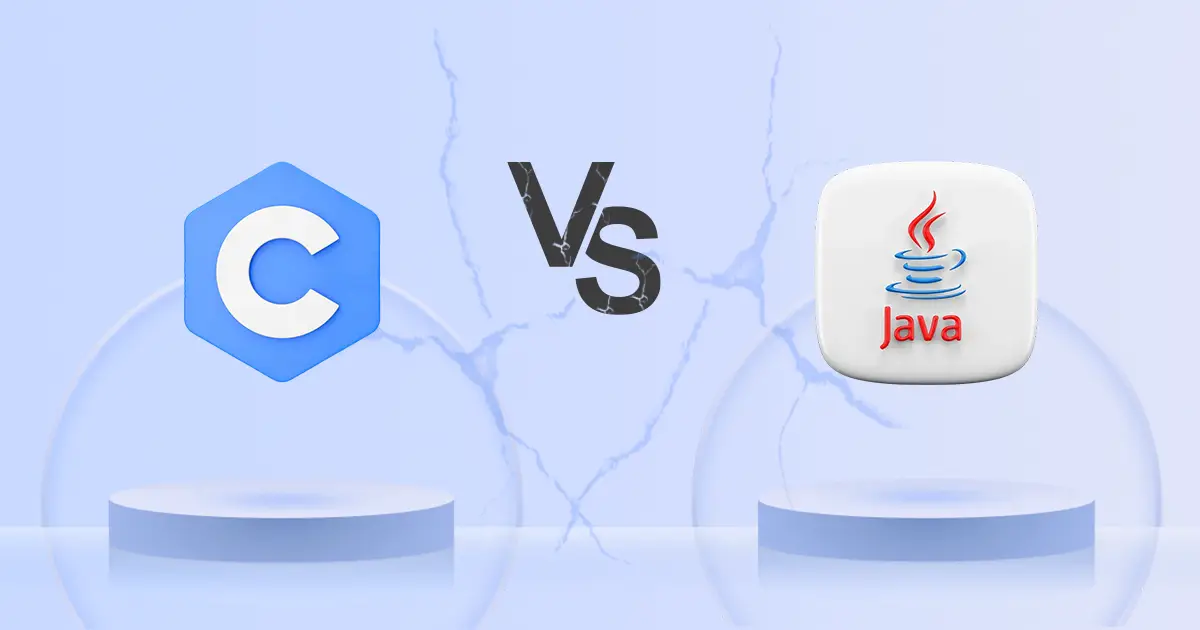The programming language era is diverse, with each language serving distinct purposes and paradigms. C and Java are notable for their historical significance, versatility, and wide use. This article examines the characteristics, differences, and similarities between these two influential languages, exploring their features, paradigms, and applicability to help determine which is more suitable for various programming needs.
What is C Language?
C is a general-purpose, procedural programming language that was developed by Dennis Ritchie at Bell Labs in the early 1970s. It has since become one of the most widely used programming languages of all time, particularly in system programming, embedded systems, and operating systems. C is known for its efficiency, low-level access to memory, and minimalistic design, which allows for fine-grained control over hardware.
Code Example in C
#include <stdio.h>
int main() {
printf(“Hello, World!\n”);
return 0;
}
In the above code, `#include <stdio.h>` is a preprocessor command that tells the compiler to include the standard input-output library. The `main` function is the entry point of a C program, and `printf` is used to print text to the console.
What is Java Language?
Java is a high-level, object-oriented programming language developed by James Gosling and his team at Sun Microsystems (now part of Oracle) in the mid-1990s. Java is designed to be platform-independent, thanks to the Java Virtual Machine, which allows Java programs to run on any device equipped with a JVM. Java emphasizes readability, robustness, and security, making it a popular choice for web applications, enterprise software, and mobile applications.
Code Example in Java
public class HelloWorld {
public static void main(String[] args) {
System.out.println(“Hello, World!”);
}
}
In this example, `public class HelloWorld` defines a class named `HelloWorld`. The `main` method is the entry point of a Java program, and `System.out.println` is used to print text to the console.
Difference Between C and Java Languages
| Feature | C Language | Java Language |
| Paradigm | Procedural | Object-oriented |
| Memory Management | Manual (using `malloc` and `free`) | Automatic (Garbage Collection) |
| Platform Dependence | Platform-dependent | Platform-independent (via JVM) |
| Pointers | Supports pointers for direct memory access | Does not support pointers (uses references) |
| Performance | Generally faster due to direct hardware access | Slightly slower due to JVM overhead |
| Syntax | Simpler, more direct control over hardware | More complex, focuses on safety and OOP |
| Compilation | Compiled to machine code | Compiled to bytecode (runs on JVM) |
| Standard Libraries | Extensive for system-level programming | Rich APIs for various applications |
| Use Cases | System programming, embedded systems, OS | Web applications, enterprise software, mobile apps |
| Error Handling | Less emphasis on exception handling | Strong emphasis on exception handling |
| Concurrency | Limited built-in support for concurrency | Built-in support for multi-threading |
| Language Development | Developed in the early 1970s by Dennis Ritchie | Developed in the mid-1990s by James Gosling |
| Security | Lower-level, less inherent security features | High-level, designed with security in mind |
Difference Between Procedural and Object-Oriented Programming Languages
Procedural programming focuses on a sequence of procedures or functions to operate on data, using a linear top-down approach. It separates data from functions, emphasizing tasks and processes. Examples include C and Pascal. Object-oriented programming, on the other hand, organizes code into objects that encapsulate both data and methods.
It promotes principles like encapsulation, inheritance, and polymorphism, enabling more modular, reusable, and maintainable code. Examples include Java and C++. OOP’s structure makes it suitable for complex applications, whereas procedural programming is simpler and more straightforward, often used for smaller, performance-critical tasks.
Similarities Between C and Java Language
| Feature | C Language | Java Language |
| Syntax | Uses semicolons, curly braces, similar keywords | Uses semicolons, curly braces, similar keywords |
| Control Structures | Supports loops (`for`, `while`, `do-while`) and conditionals (`if`, `switch`) | Supports loops (`for`, `while`, `do-while`) and conditionals (`if`, `switch`) |
| Compilation | Requires compilation before execution | Requires compilation before execution |
| Standard Libraries | Extensive standard libraries for various functionalities | Extensive standard libraries and APIs |
| Variable Types | Supports similar primitive data types (`int`, `char`, `float`, `double`) | Supports similar primitive data types (`int`, `char`, `float`, `double`) |
| Functions/Methods | Uses functions for code modularization | Uses methods for code modularization |
| Entry Point | Main function as the entry point (`int main()`) | Main method as the entry point (`public static void main(String[] args)`) |
| Operators | Supports similar operators (`+`, `-`, `*`, `/`, `++`, `–`, etc.) | Supports similar operators (`+`, `-`, `*`, `/`, `++`, `–`, etc.) |
| Conditional Expressions | Uses conditional expressions (`? :`) | Uses conditional expressions (`? :`) |
| Arithmetic and Logic | Similar arithmetic and logical operations | Similar arithmetic and logical operations |
Which One is Better: C or Java?
The choice between C and Java depends on the project requirements. C is better suited for system-level programming, embedded systems, and applications where performance and direct hardware control are crucial.
Java excels in developing platform-independent applications, web services, enterprise software, and mobile apps due to its object-oriented features and extensive libraries.
If fine-grained control over memory and hardware is needed, C is preferable. For robust, scalable applications with easier development and maintenance, Java is the better choice. Ultimately, the decision should align with the specific needs and goals of the project. The specific requirements and constraints of the project include:-
C
- Better for system-level programming, embedded systems, and applications where performance is critical.
- Provides low-level access to memory and hardware.
- Offers fine-grained control over system resources.
Java
- Ideal for web applications, enterprise solutions, and mobile apps.
- Ensures platform independence and robustness.
- Facilitates easier development and maintenance due to its object-oriented nature and extensive libraries.
Do I Need to Learn C Before Java?
Learning C before Java is not a necessity, but it can provide a solid foundation in understanding low-level programming concepts, memory management, and performance optimization. However, if your primary interest lies in application development, especially for web or mobile platforms, starting with Java might be more beneficial due to its modern features and broad applicability.
What is the average Salary of a C Programmer?
The average salary of a C programmer can vary based on experience, location, and industry. As of recent data:-
- Entry-Level: Approximately $60,000 – $75,000 per year.
- Mid-Level: Approximately $75,000 – $90,000 per year.
- Senior-Level: Approximately $90,000 – $120,000+ per year.
C programmers are in demand in industries such as embedded systems, telecommunications, automotive, and aerospace.
What is the average Salary of a Java Programmer?
Java programmers generally command higher salaries due to the language’s widespread use in various high-demand sectors. As of recent data:-
- Entry-Level: Approximately $70,000 – $85,000 per year.
- Mid-Level: Approximately $85,000 – $110,000 per year.
- Senior-Level: Approximately $110,000 – $140,000+ per year.
Java developers are highly sought after in industries such as finance, healthcare, e-commerce, and mobile app development.
Conclusion
Both C and Java have their unique strengths and areas of application. C excels in performance-critical and system-level programming, offering unparalleled control over hardware resources. Java, with its platform independence and object-oriented features, is ideal for building robust, scalable, and maintainable applications. The choice between the two depends largely on the specific needs of the project and the programmer’s career goals.
FAQs
Ques 1. Can I use C for web development?
Ans: While C is not typically used for web development, it can be used to write CGI scripts or develop custom web servers. However, higher-level languages like Java, Python, and JavaScript are more commonly used.
Ques 2. Is Java suitable for game development?
Ans: Yes, Java can be used for game development, especially for Android games. However, C++ is often preferred for high-performance game development due to its efficiency and direct hardware access.
Ques 3. What are some popular frameworks for Java?
Ans: Some popular Java frameworks include Spring, Hibernate, and Apache Struts for web development, as well as JavaFX for GUI applications.
Ques 4. How does memory management differ between C and Java?
Ans: In C, memory management is manual, using functions like `malloc` and `free`. In Java, memory management is handled automatically by the garbage collector, which frees unused objects.
Ques 5. Which language is easier to learn for beginners?
Ans: Java is generally considered easier for beginners due to its object-oriented features, extensive libraries, and built-in memory management. C, while more challenging, provides a deeper understanding of computer architecture and memory management.







